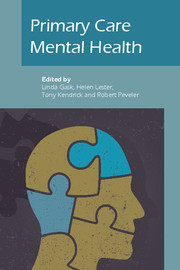Book contents
- Frontmatter
- Contents
- List of figures, tables and boxes
- List of contributors
- Preface
- Part I Conceptual basis and overarching themes
- Part II Clinical issues
- 8 Depression
- 9 Suicide and self-harm
- 10 Anxiety
- 11 Medically unexplained symptoms
- 12 Mental health problems in older people
- 13 Perinatal mental health
- 14 Child and adolescent mental health
- 15 Psychosis
- 16 Emergencies in primary care
- 17 Substance misuse
- 18 Management of alcohol problems
- 19 Eating disorders
- 20 Physical health of people with mental illness
- 21 Ethnic minorities
- 22 Asylum seekers and refugees
- 23 Sexual problems
- Part III Policy and practice
- Part IV Reflective practice
- Epilogue: Racing pigeons and rolling rocks: reflections on complex problems in primary care
- Index
15 - Psychosis
from Part II - Clinical issues
Published online by Cambridge University Press: 02 January 2018
- Frontmatter
- Contents
- List of figures, tables and boxes
- List of contributors
- Preface
- Part I Conceptual basis and overarching themes
- Part II Clinical issues
- 8 Depression
- 9 Suicide and self-harm
- 10 Anxiety
- 11 Medically unexplained symptoms
- 12 Mental health problems in older people
- 13 Perinatal mental health
- 14 Child and adolescent mental health
- 15 Psychosis
- 16 Emergencies in primary care
- 17 Substance misuse
- 18 Management of alcohol problems
- 19 Eating disorders
- 20 Physical health of people with mental illness
- 21 Ethnic minorities
- 22 Asylum seekers and refugees
- 23 Sexual problems
- Part III Policy and practice
- Part IV Reflective practice
- Epilogue: Racing pigeons and rolling rocks: reflections on complex problems in primary care
- Index
Summary
The challenges
People who develop a psychosis can find themselves strangers in their own land (Box 15.1). The health and social effects create spirals of decline and a loss of autonomy which can quickly become entrenched and difficult to address. This situation would be unacceptable in almost any other area of healthcare. It is time, therefore, to re-examine not only how primary care practitioners think about people with psychosis, but also how health services can be better organised to provide 21st-century care for patients.
What do we mean by the term ‘psychosis’?
Terminology in this area can be fraught with difficulty and ‘psychosis’ is not, of itself, a diagnosis. The primary care version of ICD–10 (World Health Organization, 2004) offers a condensed ICD–10 classification, with 23 diagnostic categories for use by generalists in primary care settings.
Box 15.1 The reality of living with a serious mental illness
• In 2003, while 83% of people in the UK agreed that a more tolerant attitude towards people with mental illness was needed, this still meant that nearly one in five believed there was no need to do so (Department of Health, 2003).
• Someone with psychosis is four times more likely than an ‘average’ person to have no close friends (Huxley & Thornicroft, 2003).
• In England, only 24% of people with mental health problems are currently in work (Office for National Statistics, 2003).
• Deaths from infectious diseases and endocrine, circulatory, respiratory, digestive and genito-urinary system disorders are significantly more likely for adults with psychosis (Harris & Barraclough, 1998).
• A person with schizophrenia can expect to live for 10 years less than someone without a mental health problem (Allebeck, 1989).
• Ninety-five per cent of carers are members of service users’ families (Rethink, 2003).
• Twenty-nine per cent of carers provide support and care in excess of 50 hours per week (Rethink, 2003).
• Ninety per cent of carers are adversely affected by the caring role in terms of leisure activities, career progress, financial circumstances and family relationships (Rethink, 2003).
- Type
- Chapter
- Information
- Primary Care Mental Health , pp. 232 - 245Publisher: Royal College of PsychiatristsPrint publication year: 2009



